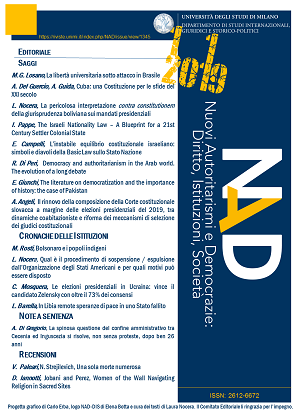Democracy and authoritarianism in the Arab world. The evolution of a long debate
DOI:
https://doi.org/10.13130/2612-6672/11793Abstract
The representation of the Arab world as ‘exceptional’ (because of an absence of democracy) when compared with other regions of the world has permeated political science debates. Falling in line with Orientalist and culturalist theses, such interpretations read the region’s political evolution as the result of chaos, randomness and external events and view Arab societies as backward and tribal. Over the decades, these readings have become tightly intertwined with studies emphasizing an inevitable clash of civilizations. In this binary contraposition, the Arab world represents an underdeveloped and violent region, largely because of Islam. The interweaving of development and democracy, which started in modernization theory in the 1950s and 1960s, has become even tighter in the era of globalization: Development, especially through the actions and the buzzwords of international organizations such as the World Bank and the International Monetary Fund, increasingly became synonymous with democracy. This paper will unpack the debate by focusing on its key elements. The intent is to show how, even as paradigms and the lexicon change, this debate is still anchored in a stereotypical and primordialist view of the entire region.
Riferimenti bibliografici
L. Anderson, Searching where the light shines: Studying democratization in the Middle East, in Annual Review of Political Science, Vol. 9, 2006.
A. Bayat, Life as Politics: How Ordinary People Change the Middle East, Stanford University Press, Stanford, 2010.
F. Cavatorta, The convergence of governance. Upgrading authoritarianism in the Arab world and downgrading democracy elsewhere?, in Middle East Critique, Vol. 19, No. 3, 2010.
J. Chalcraft, Popular Politics in the Making of the Modern Middle East, Cambridge University Press, Cambridge, 2016.
H. Gibb, H. Bowen, Islamic society and the West: a study of the impact of Western civilization on Moslem culture in the Near East, Oxford University Press, London, 1950.
B. Gills, J. Rocamora, Low intensity democracy, in Third World Quarterly, Vol. 13, No 3, 1992.
N. Guilhot, The democracy makers: Human rights and international order, Columbia University Press, New York, 2005.
N. Hashemi, D. Postel, Sectarianization: Mapping the New Politics of the Middle East, Oxford University Press, Oxford, 2017.
S. Heydemann (Ed.), Network of privileges in the Middle East. The politics of economic reform revisited, Palgrave McMillian, New York, 2004.
R. Hinnebusch, Authoritarian persistence, democratization theory and the Middle East: An overview and critique, in Democratization, Vol. 13, No. 3, 2006.
D. Lerner, The passing of traditional society: Modernizing the Middle East, The Free Press, Glencoe, 1958.
W. Rostow, The Take-Off Into Self-Sustained Growth, in The Economic Journal, Vol. 66, No. 261, 1956.
M. Valbjørn, Upgrading Post-democratization Studies: Examining a Re-politicized Arab World in a Transition to Somewhere, in Middle East Critique, Vol. 21, No. 1, 2012.










